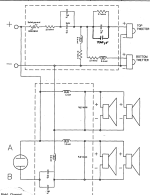having inherited a set of polk Sda 1b's, I decided to optimize.
I am a full-range guy at heart, the simpler the x over the better...
Everything I have read about the 1b x-over says that the bypass caps are not needed,
The explanation I remember is that the modern 4.7uf cap is "fast enough".
Is not the speed of the cap tied to the voltage frequency or the audio frequency?
To my understanding the signal is going around the cap,not thru it.
I am by no means an expert, I have a Electronics home study course by Heath, with the
breadboard,,,,a raw beginner at 71.
Even though i have been tinkering for 56 of these 71 years.
Just wondering.....thanks for comments.....
to bypas or not to bypass....
I am a full-range guy at heart, the simpler the x over the better...
Everything I have read about the 1b x-over says that the bypass caps are not needed,
The explanation I remember is that the modern 4.7uf cap is "fast enough".
Is not the speed of the cap tied to the voltage frequency or the audio frequency?
To my understanding the signal is going around the cap,not thru it.
I am by no means an expert, I have a Electronics home study course by Heath, with the
breadboard,,,,a raw beginner at 71.
Even though i have been tinkering for 56 of these 71 years.
Just wondering.....thanks for comments.....
to bypas or not to bypass....
Picture of the XO?
In a commercial loudspeaker i can see saving some money by using an ELCO (or other REALLY cheap cap) and bypassing with a plastic cap. Just replacing with a plastic cap should improve things.
dave
In a commercial loudspeaker i can see saving some money by using an ELCO (or other REALLY cheap cap) and bypassing with a plastic cap. Just replacing with a plastic cap should improve things.
dave
At low frequencies (that means all audio frequencies), I'd suggest you first focus on the circuit, the response you're chasing and other acoustic considerations, and use whatever sufficiently rated components that provide the values you require.the bypass caps are not needed,
